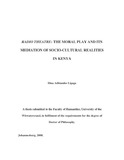| dc.description.abstract | This study examines the social and political relevance of the genre of radio drama. The study focuses on the production of the programme Radio Theatre that features one-act plays, which air every week for the state broadcaster, Kenya Broadcasting Corporation (KBC). The study engages with the tension created by the programme’s production in a state broadcaster, and the fact that Radio Theatre plays draw their themes from everyday life. This tension has enabled us to question the validity of cultural productions such as Radio Theatre, which, although informed by ‘official’ discourse, can be read in the realm of popular cultural productions. Using the theory of the moral story, the study has attempted to look at the various ways in which Radio Theatre addresses its perceived audiences. The first chapter engages with the theoretical framework and literature review concerned with radio drama, broadcasting and the context of Radio Theatre’s production. The second chapter explores the history of radio drama’s production in Kenya in more detail. As such, it engages with the politics that informed radio broadcasting in Kenya, from the colonial era up to the postcolonial period. The third chapter looks at how Radio Theatre plays have been used to promote the state’s agenda of national unity in Kenya. Looking at a play that uses marriage as its dominant narrative, the chapter explores the ways in which Radio Theatre fulfils its role as an educational drama. However, a detailed reading of the play in question reveals several gaps that offer spaces for counter-reading for the imagined audiences. The fourth chapter is an exploration of Radio Theatre’s engagement with sexual morality. The chapter draws from the Kenyan social context, which defines sexual morality using traditional and Christian structures. As such, the chapter engages with the melodramatic presentations of four plays which deal with issues of marriage and infidelity. The last chapter looks at Radio Theatre’s exploration of developmental themes, a fact that points towards collaborations that KBC has made with NGO organizations interested in similar agendas. The chapter analyzes five plays that look into themes of HIV/AIDS, forced marriages and infertility. Arguing that such plays seek to encourage self-development, the chapter looks at theories that have been used to analyze the developmental values of soap operas in developing countries. The concluding chapter offers a summary of the study, and possible ways in which a study such as this could be expanded | en |

